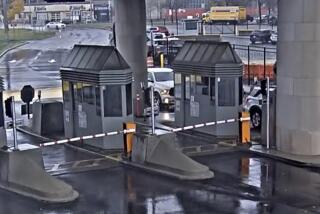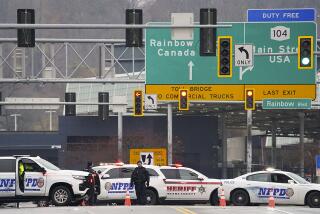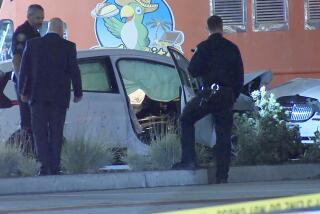China calls car crash a terrorist attack, arrests 5
BEIJING — More than 48 hours after a car mowed down pedestrians and burst into flames at Beijing’s Tiananmen Square, the Chinese government broke its near-silence on the incident and characterized it as a “terrorist attack.”
State media on Wednesday identified the car’s occupants as members of one family: the driver, Usmen Hasan; his mother, Kuwanhan Reyim; and his wife, Gulkiz Gini. All three were killed, along with two tourists.
Chinese authorities also said five people were arrested as accessories in Beijing on Monday night.
“The arrests were made 10 hours after the incident, which has now been identified as a terrorist attack,” state broadcaster CCTV said on an English-language microblog account.
The attack was “carefully planned, organized and premeditated,” police were quoted as saying by the official New China News Agency.
The names of those arrested suggest that they are Uighurs, a mostly Muslim ethnic minority from the Xinjiang region of northwestern China, which borders Afghanistan and Pakistan. But an earlier police notice said more people were being sought, including a 21-year-old man with the ethnic Han Chinese name of Liu Ke from Sichuan province.
A Chinese tourist who narrowly escaped injury Monday told The Times that he had seen a black flag with Arabic script being waved from the front passenger window shortly before the car burst into flames.
Authorities said that a similar “jihad” flag was found, along with knives, in a temporary apartment of the five suspects who were arrested.
Two of the suspects, identified as Yusup Umarniyaz and Yusup Ahmat, had been named Monday in an emergency notice asking Beijing hotels to keep a lookout for them.
They are from the outskirts of the Silk Road oasis of Turpan, which has been rife with ethnic violence since the spring. In March, Uighurs accused an ethnic Han man of hacking to death a 7-year-old boy in the area. That was followed by a series of riots at police stations and government offices that left dozens of people dead. The incidents have had only minimal coverage in the Chinese media.
Many Uighurs bristle at restrictions placed by Chinese authorities on their practice of Islam, including periodic bans on wearing head scarves and beards and on fasting during the holy month of Ramadan. A banned group known as the East Turkestan Islamic Movement, which incorporates the Uighur name for Xinjiang, has operated across the border in Afghanistan and Pakistan for the last decade, but experts disagree on its capabilities and organization.
Like Monday’s attack at Tiananmen Square, most assaults have involved the crudest of weapons — gasoline and knives, occasionally Molotov cocktails.
“This violence has caused innocent civilians to die,” CCTV said in a news commentary. “It has exposed the ugly face and cruelty of those criminals.... As the common enemy of mankind, terrorism will surely go bankrupt.”
Although numerous attacks in China have been attributed to Uighur separatists, until this week all had occurred in Xinjiang. Chinese police said they had foiled various attempted attacks in Beijing in the run-up to the 2008 Summer Olympics.
There were suggestions that Monday’s attack was better coordinated. A report on Radio Free Asia said surveillance videos showed a second car on the scene with Xinjiang license plates followed the first car but stayed on the main road while the other drove onto the sidewalk.
The attack took place at 12:05 p.m. in front of the portrait of Mao Tse-tung overlooking the square, which is always filled with tourists.
Four tourists from the Philippines were among those struck by the car. Rizalina Bunyi, an obstetrician, was killed, while her husband, also a doctor, and two daughters, both medical students, were injured.
According to friends, they had arrived in Beijing the night before and were looking at a map when the car plowed through the crowd.
A Chinese man from Guangdong province was also killed, and about 40 people were injured.
More to Read
Start your day right
Sign up for Essential California for news, features and recommendations from the L.A. Times and beyond in your inbox six days a week.
You may occasionally receive promotional content from the Los Angeles Times.






